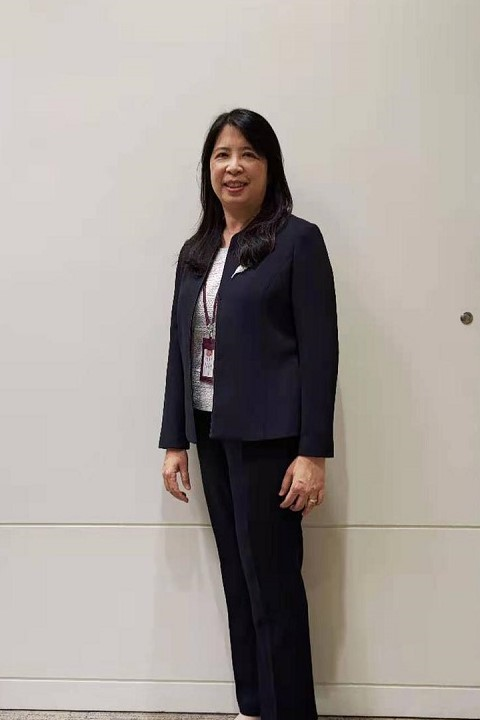Recipient of Sir Edward Youde Memorial Scholarship for Undergraduate Students in 1987/88
尤德爵士紀念基金本科生獎學金1987/88年度得獎者
The annual investment results of the Exchange Fund are watched closely by the public at the end of January each year. The recipient of Sir Edward Youde Memorial Scholarship for Undergraduate Students in 1987/88, the Executive Director (Risk and Compliance) of Hong Kong Monetary Authority, Ms. Grace Lau is responsible for monitoring the risk exposure of the Exchange Fund, ensuring the stability and growth of the Fund.
Ms. Lau was born to a low-income family. She had outstanding academic achievements ever since secondary school. Given her strong interest in the subject of Economics, she chose to study the Bachelor of Social Sciences degree at the University of Hong Kong, where she majored in Economics and minored in Statistics. Upon her graduation, she was immediately recruited as an executive officer of the government, and became a government statistician a few months later. She joined the Hong Kong Monetary Authority in 1994. Despite her heavy workload, Ms. Lau pursued part-time studies and managed to finish two master’s degrees in Economics and Investment Management, which laid the foundation for her current career.
Working in the compliance field, Ms. Lau has witnessed the regulatory reform after the most recent financial crisis in 2008. She pointed out that the crisis was brought by the complicated derivatives whose structures were too difficult for investors to evaluate the risks. The crisis highlighted areas for improvement in the supervision of the financial system, hence, governments and regulatory bodies were prompted to implement stricter regulatory requirements. Regarding the disputes over the optimal level of regulation, Ms. Lau responded by describing the regulatory system as a pendulum. After the financial crisis, regulators will tighten the regulatory requirements to ensure better protection for consumers. However, such changes will inevitably also increase the transaction costs for investment. Over time, having regard to the implementation experience and feedback from the market, regulators will adjust the form and intensity of regulation by applying a risk-based approach to offer different degree of protection to investors with varying risk appetites. Adjusting the regulation is not solely a relaxation of rules but a way to make the regulatory environment more conducive to market development while at the same time striving for better market integrity and consumer protection.
The issue of the Exchange Fund has always been a talk of the town in recent years. There have been suggestions that Hong Kong should emulate Singapore and establish a sovereign wealth fund in order to gain a better return. In response to this, Ms. Lau indicated that not only does the Exchange Fund play an important role as Hong Kong’s foreign currency reserve assets; it also manages the fiscal reserves of the government. As such, on the one hand, the Exchange Fund must maintain sufficient liquidity to meet operational needs. For example, it needs to support the government’s drawing down part of its fiscal reserves to deal with the epidemic in 2020. On the other hand, in order to preserve the Fund’s long-term purchasing power, the Exchange Fund is also invested in the stock market and private equity market , which is not a common practice for global central banks. Ms. Lau reckoned that putting all assets in a single fund is a more appropriate arrangement in terms of amassing resources against external shocks and reaping economies of scale in investment.
Ms. Lau received the Sir Edward Youde Memorial Scholarship in 1987/88. She was invited to an interview paneled by the Dean of the Faculty of Social Sciences of the University of Hong Kong. She was grateful for the nomination of the faculty for electing her as the awardee of the first cohort. She exclaimed that the Scholarship is a great recognition of her hard work, which has brought a positive impact to her subsequent developments. It has been more than 30 years since she was awarded the scholarship. The fact that she is holding an important position in society does not stop her from continuing to pursue studies in different areas. Knowing that the future workplace requires interdisciplinary knowledge and skills, she kindly suggests youngsters to pursue life-long learning to keep abreast of the times.
每年1月底,外匯基金的投資表現總會是市民關心的議題。尤德爵士紀念基金獎學金1987/88年度得獎者,香港金融管理局風險管理及監察部助理總裁劉慧娟女士,一直替外匯基金管理相關的投資風險,為香港人的「錢袋」做好把關工作。
劉慧娟女士生於草根家庭,中學時學業成績優異,對經濟科興趣甚濃,所以她選擇在香港大學修讀社會科學學士學位, 主修經濟學,副修統計學。畢業後,她加入政府成為行政主任,及後於政府統計處工作,並在1994年投身香港金融管理局。儘管工作繁忙,劉女士仍兼讀並成功完成經濟學及投資管理學理學碩士學位,為目前事業打下基礎。
在監管的崗位上,劉女士見證了上一次金融危機導致的監管改革。她指出,2008年的全球金融危機是由複雜的衍生工具引起,因為產品結構過於複雜,令投資者難以對產品的風險作出評估。該次危機顯示出金融體系監管有需要改善的地方,促使各國政府及監管部門實施更嚴格的監管。對於金融監管鬆緊之爭,她認為監管制度的變化就如鐘擺一般有周期性:在金融危機後,監管機構一定會收緊合規要求,確保投資者獲得更全面的保障,但免不了亦會增加投資者的交易成本。當政策收緊到一定程度,監管機構會按經驗及業界的意見調整監管的範圍及力度,把不同風險胃納的投資者按級別分類,以風險為本及具針對性地為他們提供不同程度的保障。放寬監管並非單純地把規則放鬆,而是使監管環境更有利於市場發展,同時確保金融機構秉持良好的操守以及為投資者提供更適切的保障。
近年來,外匯基金的定位不時都成為社會大眾討論的議題。有人建議仿效新加坡在外匯儲備以外建立一個主權基金,透過一些較進取的投資項目增加整體回報。劉女士指出,外匯基金除了扮演外匯儲備的角色外,亦有管理政府的財政儲備。因此,基金必須一方面保持流動性以確保其日常操作,就好像在2020年疫情爆發之初政府就向基金提取部分財政儲備作額外的開支;但另一方面為了提高回報以保障基金的長期購買力,基金亦參與股票甚至私募股權投資,這種進取的投資策略在全球中央銀行來說較為少見。她認為,現時把所有資產統合在局內管理是較合適的安排,因一旦分家,會令用作抵禦外來衝擊的資源減少,以及削弱資金規模,增加投資成本。
劉女士於1987/88年度獲得尤德爵士紀念基金的獎學金。當時,她受邀參與基金會的面試,面試小組的成員包括香港大學社會科學學院的院長。劉女士十分感激當年學院的推薦,使她有幸成為獎學金第一屆的得獎者。當年獲得獎學金基金會的認同和肯定對劉女士往後的發展起到了正面的作用。得獎至今超過30年,即使現時身居要職,她亦一直走在學習的路上。她相信職場的環境不斷變化,未來的工作將需要更多跨學科的知識和技能,所以她寄語年輕人要終身學習,才能趕上時代的步伐。

